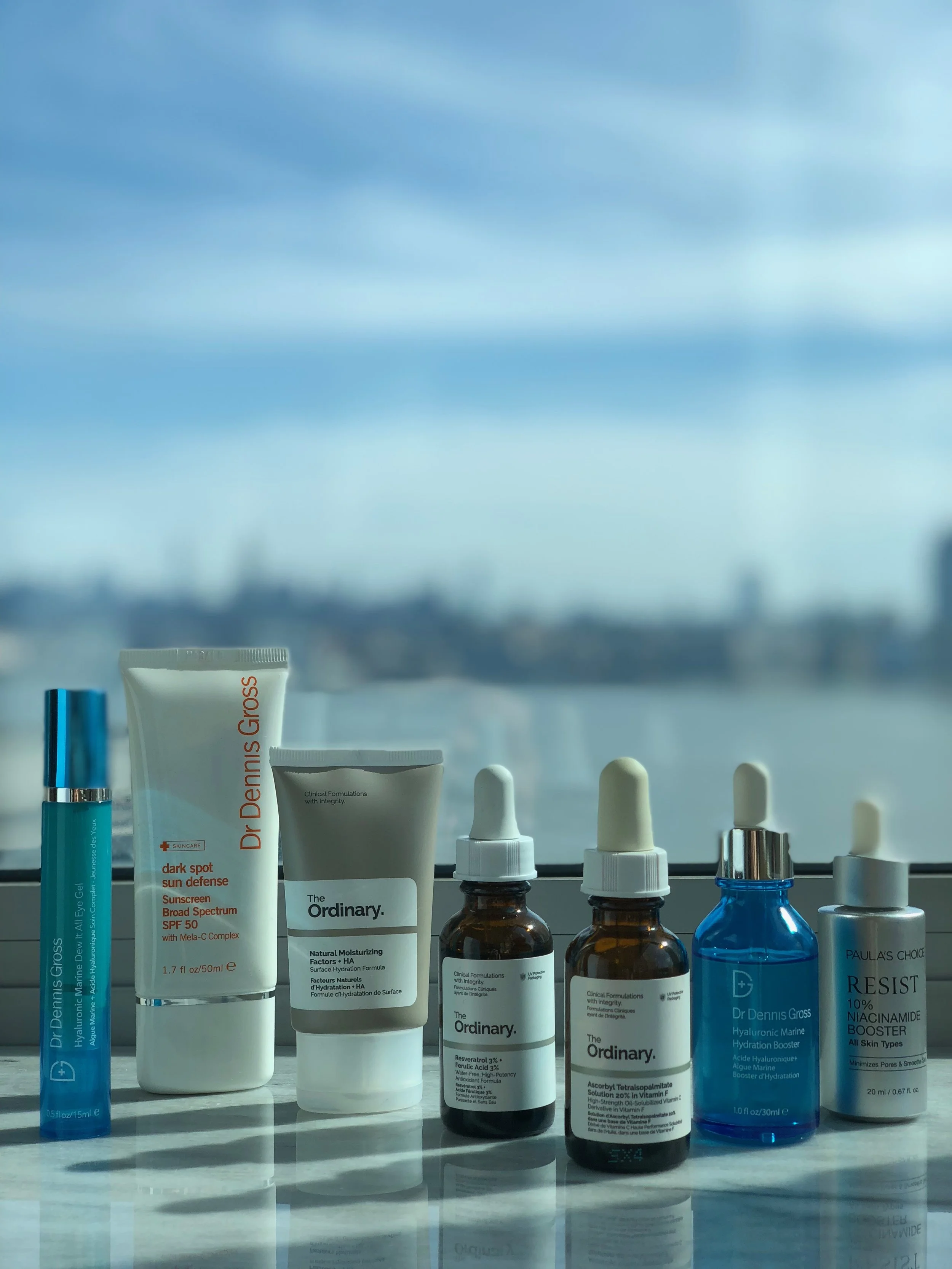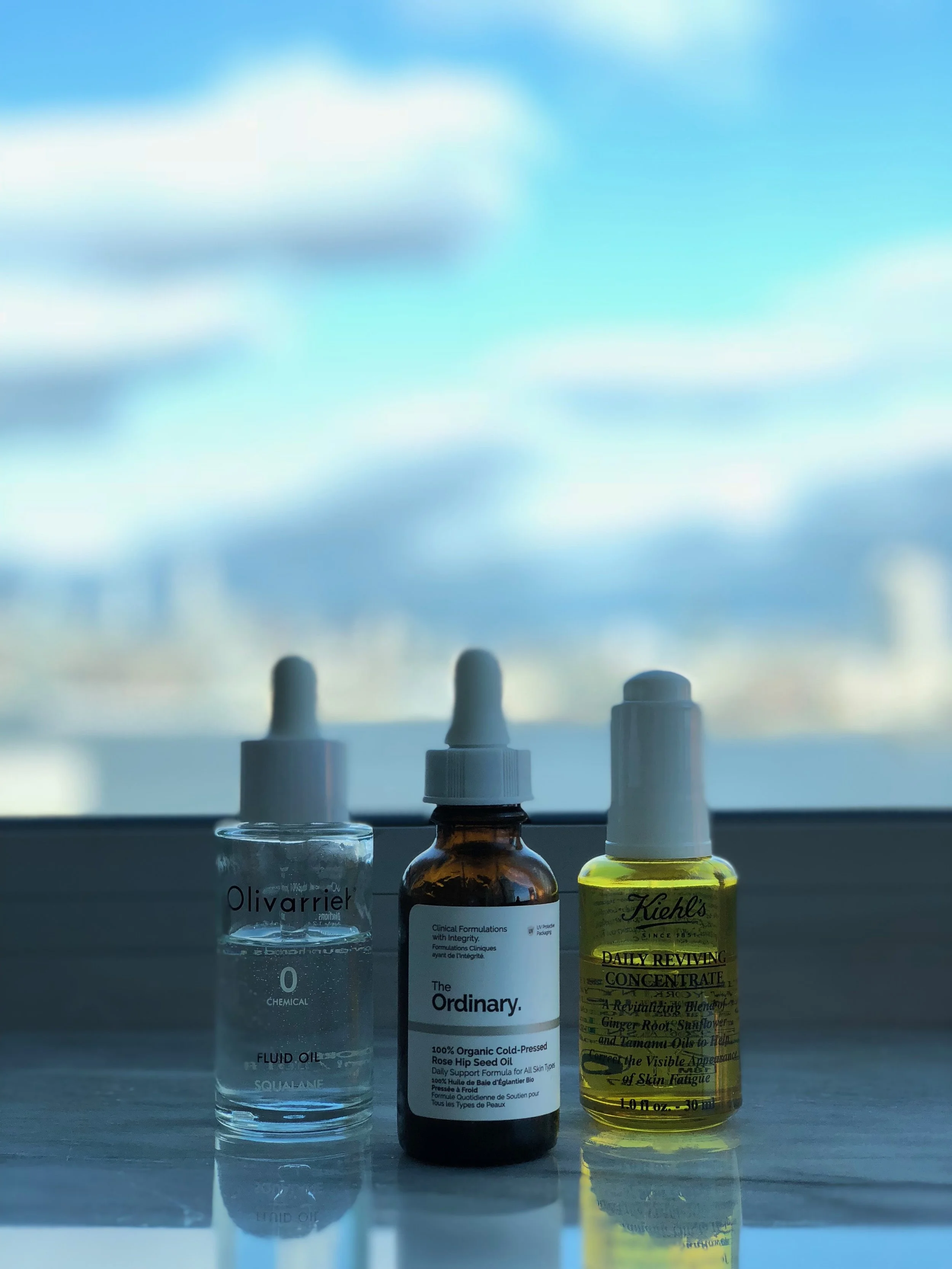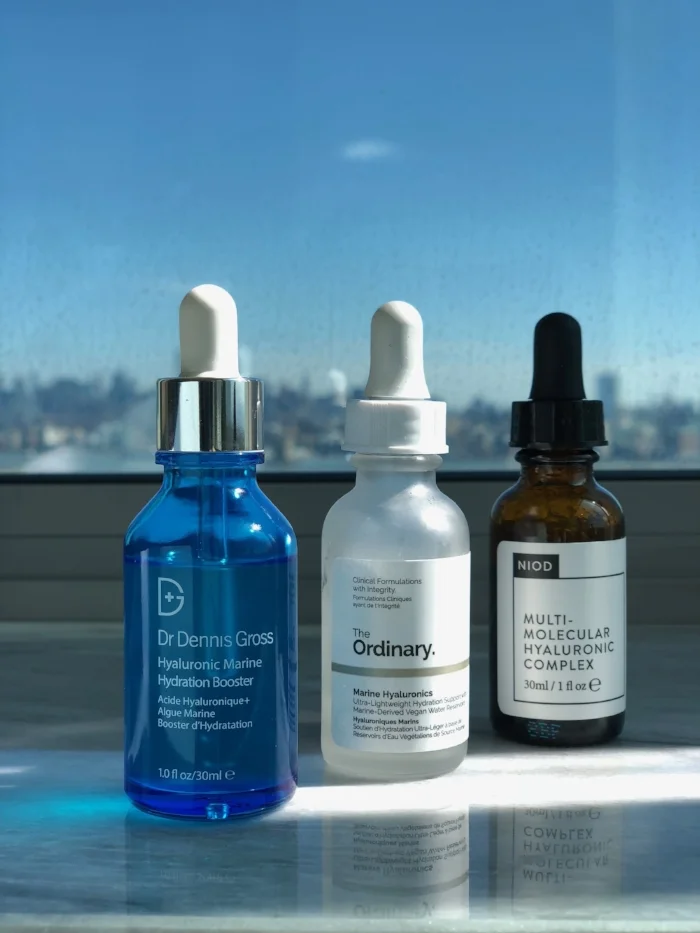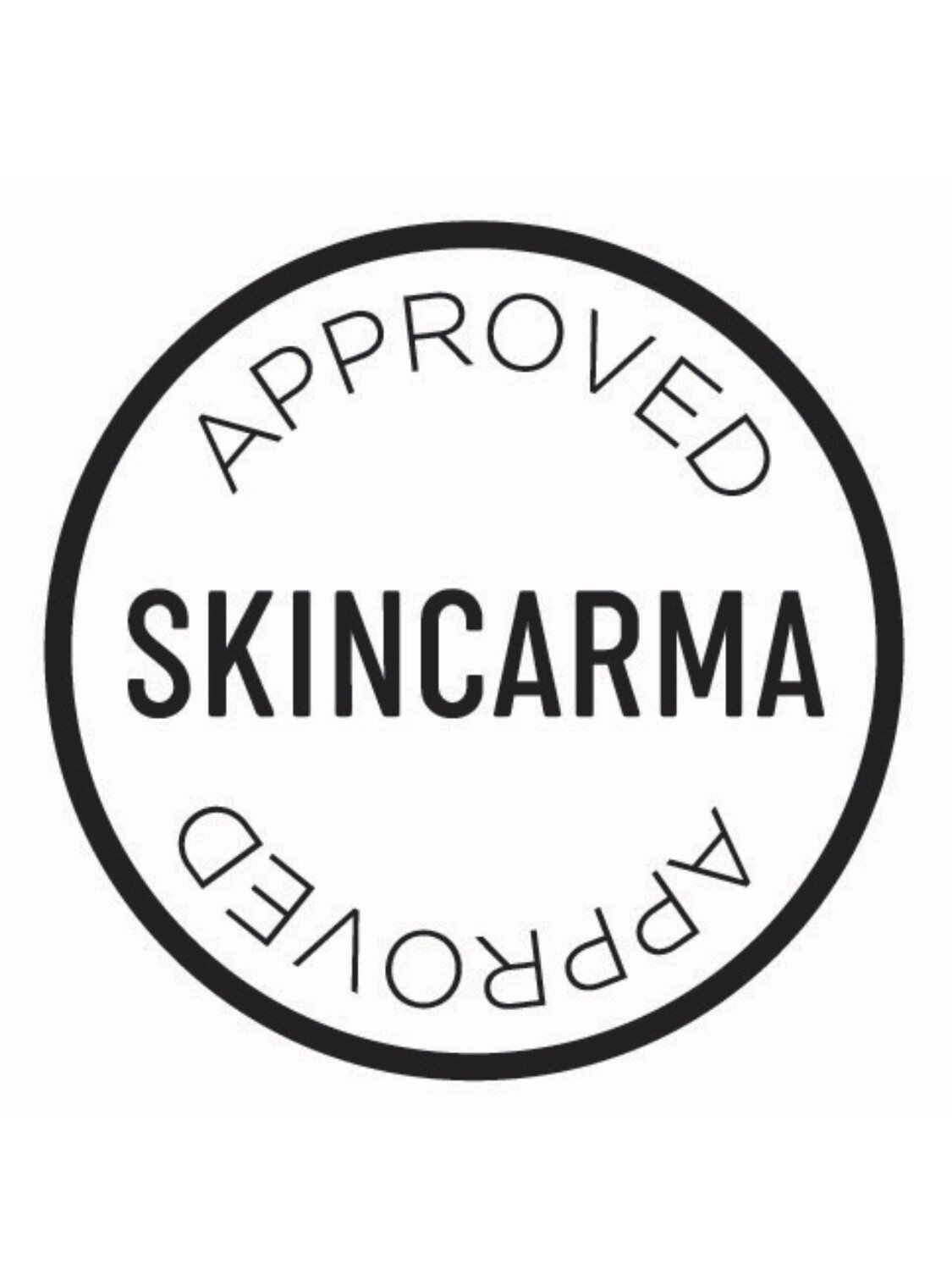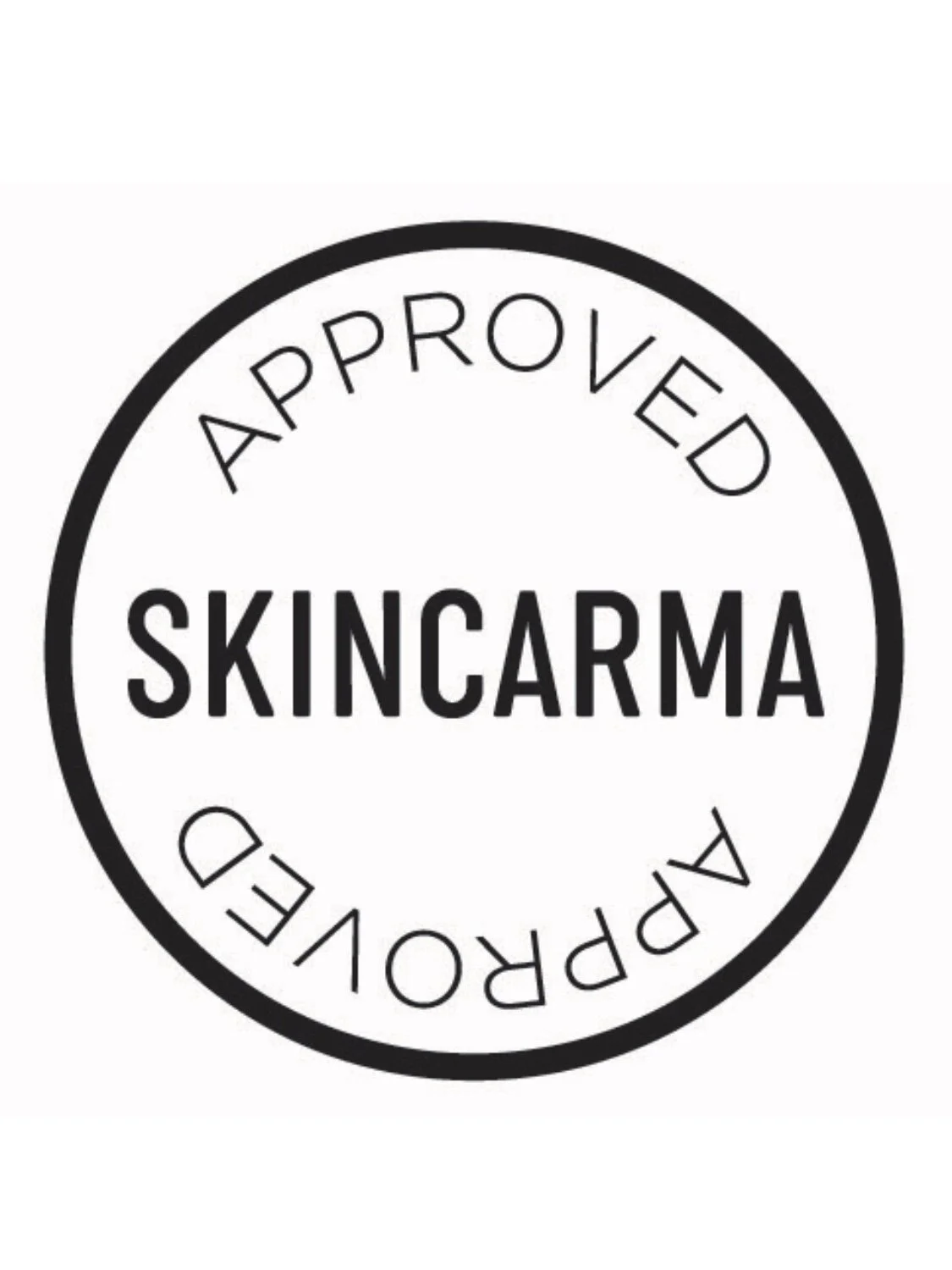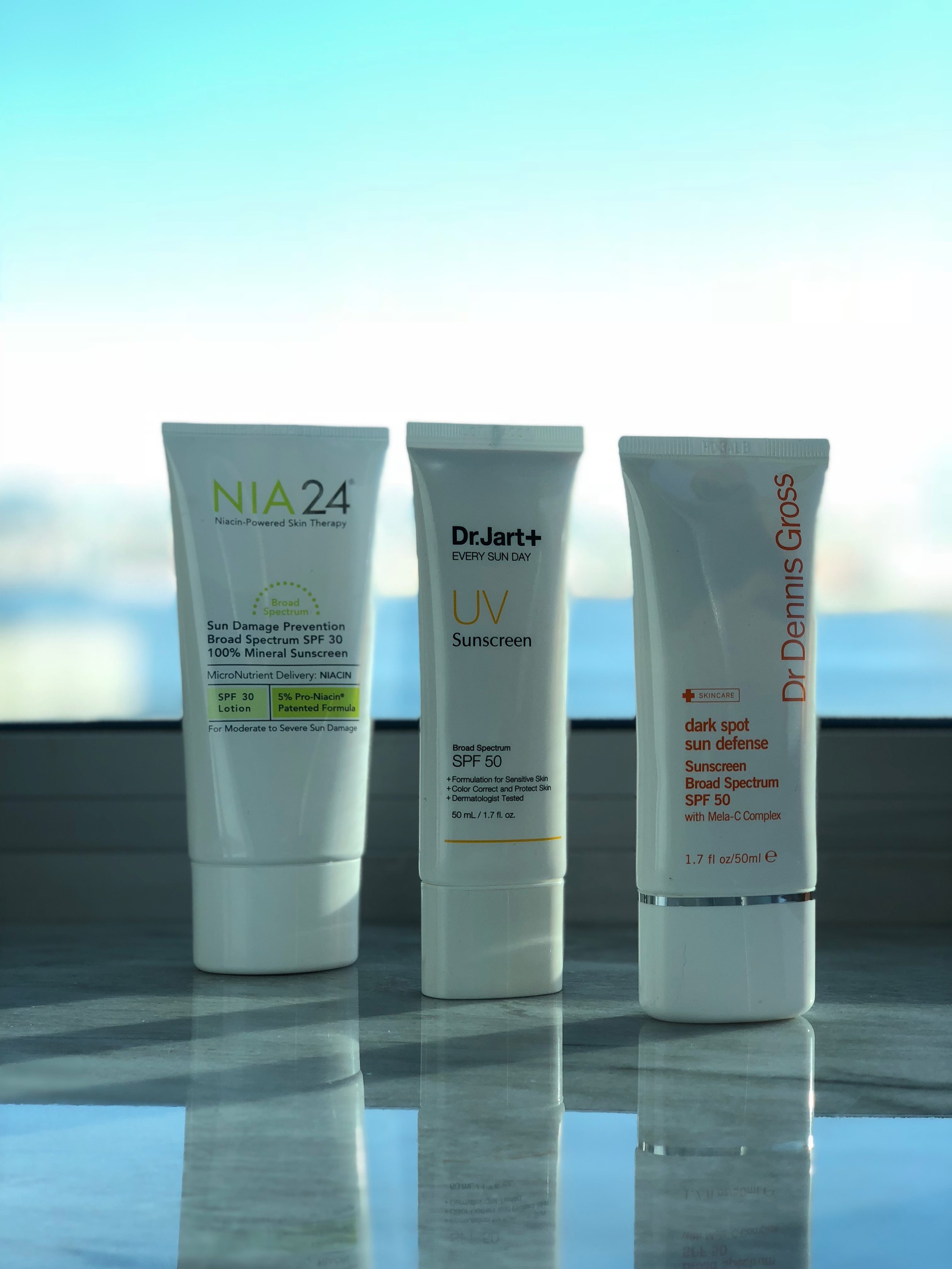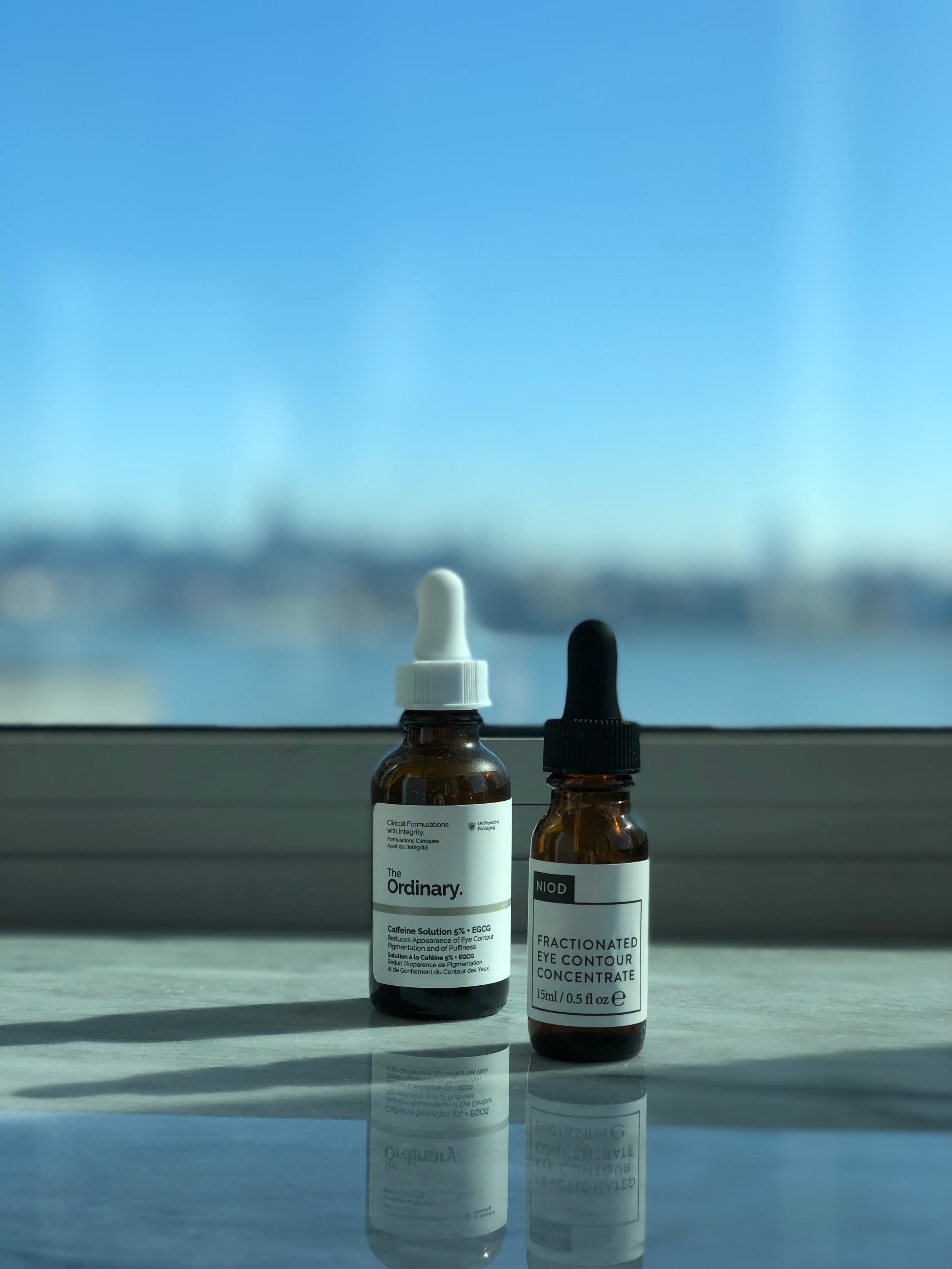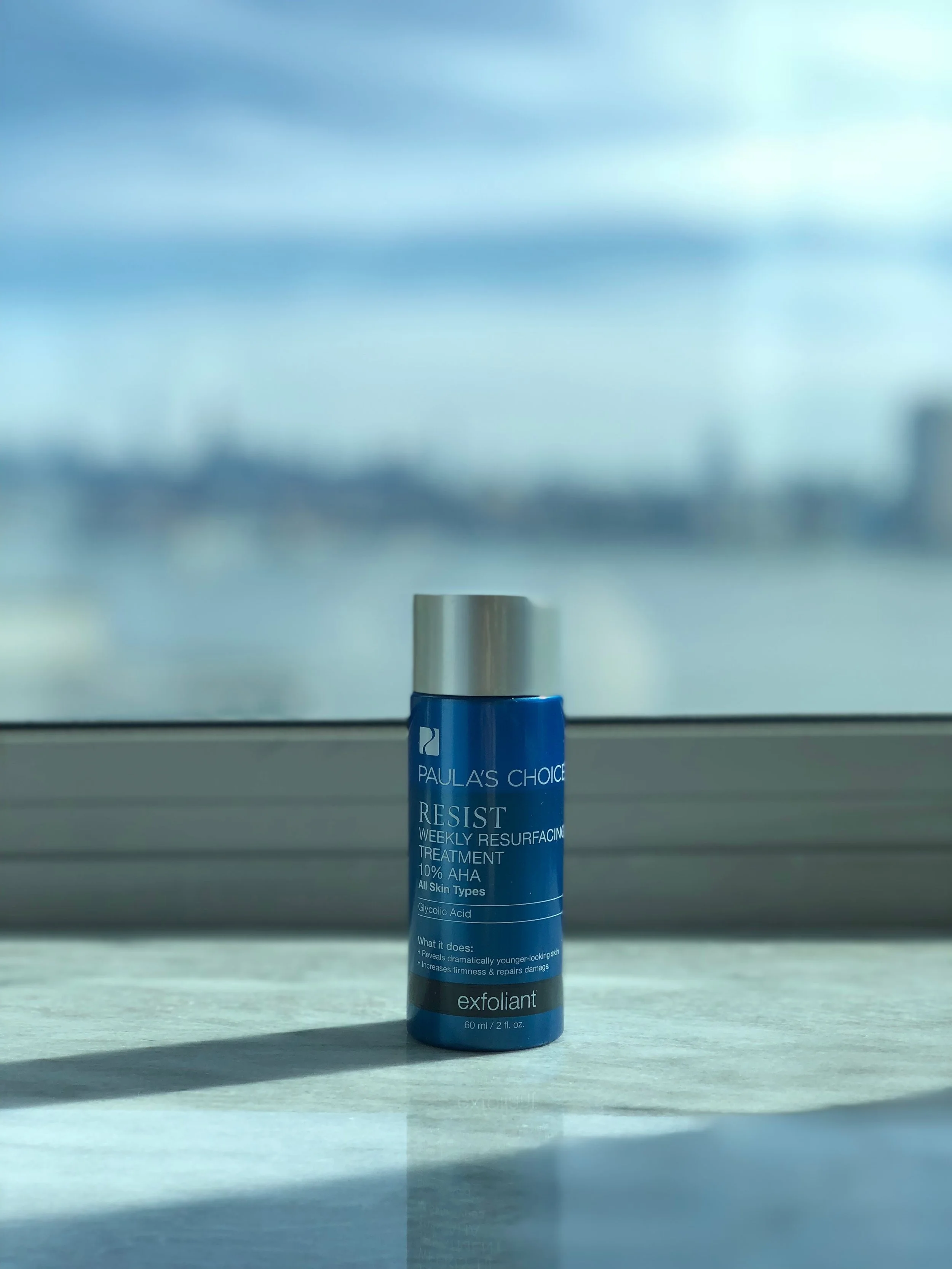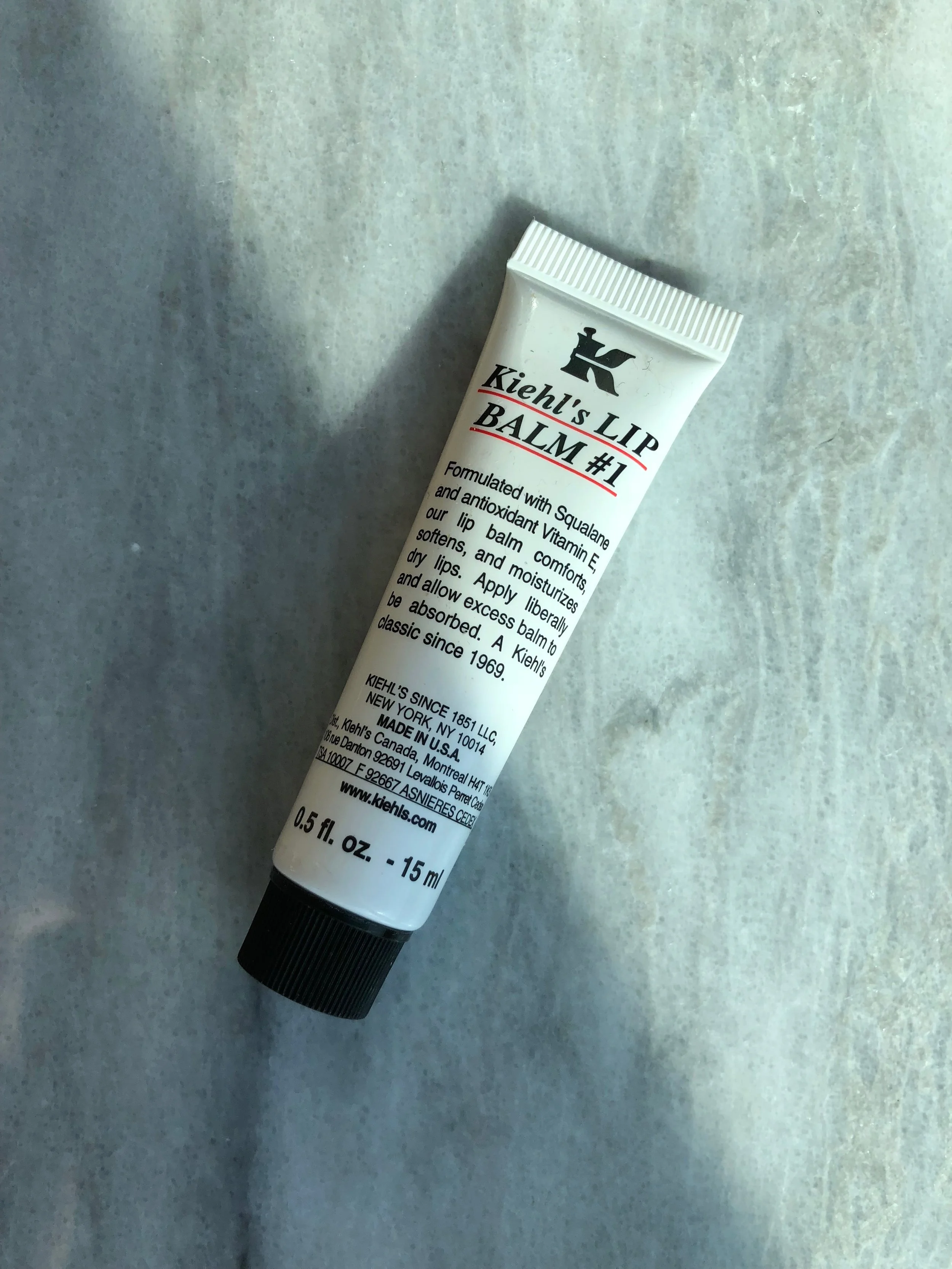SKINCARE 101 : How to Put Together a Healthy Skincare Regimen 👨🏼💻
I get questions all the time about what makes a complete skincare regimen. In fact, I regularly receive product lists, photos, even spreadsheets of whole regimens from great friends and perfect strangers alike. All of them wondering if what they’re doing is right for their skin, if anything is missing that their skin really needs — and if a certain product is worth the cost. They want to know what I think of a specific formula and whether they're using products in the right order. Just as often, they want to know if they're being scammed by skincare marketers.
A perfect skincare regimen shared with me by a fellow skincare devotee.
“Come on, do I really need to wear sunscreen on a cloudy day? What’s the big deal with double cleansing? Why is The Ordinary so cheap? Which Vitamin C serum is best? Is La Mer really worth $170? ”
Most important, of course, is determining whether the products in your skincare routine are delivering everything your skin needs to stay healthy — and not doing anything that damages your skin. A lot of what we put on our faces can actually be harmful and even pro-aging! Imagine that. It took me years of paying attention, product trial, and research to know the difference between right and wrong in skin care.
While the adage "curiosity killed the cat" is often true, when it comes to skin care, curiosity gives skin 10 lives!
Orpheus and me
How do you know if your skin care is right or wrong for your skin?
Well, it’s actually not that difficult. You have to start with a few mandatories — things you should never do without. (And always starts with a clean face. Any cleanser will do. You'd never start painting on a dirty canvas, right?!) There are products and ingredients that every great skincare routine needs if it's going to maintain, protect and restore the health of your skin. Without them, your skin may not be getting everything it needs to sustain itself each day. And, just as important, is avoiding products and ingredients that can harm your skin and cancel out the good you think you’re doing. I'll organize it into three categories:
MUST-HAVE + MUST AVOID + OPTIONAL
“THE MUST-HAVES:”
Moisture (oil-based).
Your skin needs moisture in the form of oils, lipids and fats. Ingredients like squalane and glycerin, which are naturally occurring in skin, help keep it plump, healthy and youthful. When your skin dries out, it can't function at its best, becomes sluggish and unhealthy. Wrinkles and lines form more quickly and existing ones become more prominent. Besides looking tired and lifeless, dry skin isn't as receptive to topical treatments, i.e. what you put on it isn't as effective. Start thinking about dryness as a huge no-no and take measures to assure your skin is getting all the loving moisture it deserves.
Hydration (water-based).
Three very well-formulated Hyaluronic Acids serums.
Our skin needs water! Hydrated skin = healthy skin. Without water, we can't survive for very long. And the same goes for your skin. Up to 60% of the adult human body is water. In fact, the brain and heart alone are composed of 73% water and a whopping 83% of our lung mass is water. (Bet, like me, you thought it would be mostly air!) Skin holds water in its layers like a sponge. In skin care, the superstar ingredient every healthy skin regimen needs is Hyaluronic Acid. It has the ability to attract and hold water in the skin like a hydration magnet. Find yourself a great Hyaluronic Acid serum and make it a priority in your regimen —morning and night.
Antioxidants.
You may not be aware of it, but your skin is under constant attack throughout the day. It's vulnerable to continuous damage at a cellular level from pollution, stress, UV, and even the aging process itself. Antioxidants are the secret weapons your skin needs to defend against all of it. If you live in a city like I do, your skin needs all the reinforcements you can give it to prevent damage from (wait for it) — free radicals. Free radicals are molecules that invade our cells and wreak all kinds of havoc, causing damage that weakens the skin barrier and accelerates skin aging. Antioxidants counteract the impact free radicals have by restoring molecular balance in your cells. I think the best way to describe the impact of free radicals is that they short circuit skin cells. Antioxidants restore your cells' circuitry so your skin can function as it needs to in order to stay healthy and youthful looking. Many of the most potent antioxidants come in the form of vitamins we're all familiar with, including Vitamin A (Retinol), Vitamin B3 (Niacinamide), Vitamin C (Ascorbic Acid) and Vitamin E (Tocopherol). So take your vitamins. Just like your mother hounded you to do!
Sunscreen.
Honestly, this should have been the first essential product at the top of the list of Must-Haves. To be candid, if you have a genuine concern for skin aging and the overall health of your skin, you cannot omit sunscreen from your morning skincare routine. You may as well not even bother washing your face — let alone spending a dime or the time on skincare products. From an early age, I recognized the vital importance of sunscreen. In fact, I started using a regular daily sunscreen moisturizer in my early 20s. Thirty or so years later, I look at least 10 years younger than I am. And a lot of that is attributable to the fact that I have made a concerted effort to protect my skin from UV damage. I love the sun as much as the next guy, but as with everything you love in life, it has its drawbacks. Don't kid yourself — you need to wear sunscreen even on cloudy, seemingly sunless days. If the sun is out, its invasive, invisible UV rays can and will reach your skin. The obvious and most visible effects of UV damage are skin cancer, hyperpigmentation (sun spots) and fine lines and wrinkles. But the sun’s UVA rays deeply penetrate skin down to the dermis where youth-preserving collagen and elastin are found. Over time, unprotected sun exposure degrades levels of both in your skin without the results of that becoming apparent until later in life. The levels of collagen and elastin already diminish with age; sun exposure only accelerates the process. With a loss of collagen and elastin, skin collapses on itself, leading to deeper wrinkling and creasing, loss of firmness and sagging. Start to think of sun protection as anti-aging at its very best.
If you need proof of the very real effects of sun damage on skin, just look at identical twins Jeanne and Susan. The sisters looked exactly alike growing up. But Susan has spent her life in Florida worshiping the sun (she's also a heavy smoker, a double whammy!) while sister Jeanne lives in Ohio and has generally avoided overexposure to the sun (and smoking) throughout her life. While both were 61 when the photo was taken, scientific study of Susan's skin showed an 11-year age difference — Susan has extreme hyperpigmentation (sun spots), deeper wrinkles and degradation in skin elasticity. I trust Susan is a lovely woman, but she hasn't shown herself as much self-love as she deserves.
Twin sisters Jeanne (left) and Susan (right).
“THE MUST AVOIDS:”
Denatured alcohol.
When I turn around a product carton at Sephora to scan its ingredient list (aka IL), or click on the "Full Ingredients" link on a product's web page, the first thing I look for is the word alcohol. Perhaps because I'm a writer, or more likely because I'm a copywriter specializing in skincare product packaging, I can spot this single ingredient in a 4-point-font list from across the room.
Alcohol is forbidden on my skin. Interdit. Verboten. Proibito. 금지 된 . Forbidden!
Why? Because it's the opposite of anti-aging. In fact, it's pro-aging. Nearly without exception, if a skincare product contains alcohol, I put it down. If I'm online, I sigh and hit the back button. It makes me sad because it's not a product I'll be experiencing no matter how much I want to try it or what brand it's from. But I get over it. Let's get one thing clear. There are several forms of alcohol used in skincare formulas, i.e. there are good alcohols and there are bad alcohols!
Are you a good witch, or a bad witch?
Even Glinda the Good Witch knows not to use denatured alcohol on her skin! Why would you?!
There are what are called fatty alcohols, which can have emollient or humectant properties and actually be very good for your skin. Examples of these good-for-skin alcohols include: behenyl alcohol, cetyl alcohol, stearyl alcohol, and cetearyl alcohol. If you see these in a product's IL, pat it into your face and smile all the way. 😀
And that brings us to the wicked alcohol — the bad witch of any skincare formula! These are referred to as "volatile alcohols," with low molecular weights, that are both drying and sensitizing. They're found on ingredient lists under the names ethanol or ethyl alcohol, denatured alcohol, methanol, isopropyl alcohol, SD alcohol, and benzyl alcohol. Sure, like anything, if included in very small amounts, they can be innocuous. But over time, the damaging effects are cumulative. A good rule to follow (if you don't want to impose a zero-tolerance policy on alcohol like I do!) is the Top Ten Ingredient Rule. If a form of volatile alcohol appears in the first ten ingredients on the list, consider the level to be too high for your skin. It's certainly pro-aging and will damage your skin.
The Skincare G.O.A.T. Paula Begoun is perhaps the loudest voice in the zero-tolerance alcohol policy camp. Mine is but a whimper! But rather than paraphrase, I'll just employ the words of the master herself:
““In addition to being drying and sensitizing, these alcohols can disrupt skin’s surface layers. Alcohol helps ingredients like retinol and vitamin C penetrate into the skin more effectively, but it does that by breaking down the surface layers of skin—destroying the very substances that keep your skin feeling healthier and looking younger over the long term.””
It gets worse. Paula says, "Alcohols like SD and denatured immediately harm the skin, starting a chain reaction of damage that continues long after it has evaporated. A 2003 study published found that with regular exposure to alcohol-based products, cleansing becomes a damaging ordeal—skin is no longer able to keep water and cleansing agents from penetrating into it, thus further eroding its surface layers...If that weren’t bad enough, exposure to alcohol causes healthy substances in skin to literally self-destruct. The research also showed that these destructive, aging effects on skin’s substances increased the longer the exposure to alcohol; that is, two days of exposure was dramatically more harmful than one day, and that is only from exposure to a 3% concentration (most skincare products with denatured alcohol contain greater amounts than that)."
I have zero tolerance for alcohol. (Wine gets a Skincarma exemption.)
Fragrant plant essential oils.
As with denatured or volatile alcohols, above, I avoid essential oils in my daily skincare routine. More specifically, I'm referring to "fragrant plant" essential oils. These include popular essential oils cherished for their pleasant fragrance like lavender oil, rose oil, peppermint oil and orange, lime and lemon oils — to name a few! While they're referred to as "essential," when it comes to skin care and the health of your skin, they're anything but essential. I know, they smell so good though! We can't imagine our favorite facial oil, like the Sunday Riley Luna Sleeping Night Oil, would do anything to harm our skin. But in addition to skin-replenishing avocado oil, chia seed oil and grape seed oil, the popular treatment is loaded with skin-sensitizing ylang ylang, blood orange oil and vetiver. (Consider dabbing it on your wrists or behind your ears instead.)
While pleasing to the senses (that is, to the one sense of smell), fragrant plant oils have a strong potential to sensitize and aggravate your skin, compromise and weaken your protective (and precious!) skin barrier, and worst of all — oxidize on skin, causing free-radical damage.
One of the key reasons why the breakout skincare brand Drunk Elephant is coveted for its reliable formula efficacy is because the company recognizes the pro-aging damage that fragrant plant essential oils cause our skin. If you want to incorporate a really well-formulated, replenishing facial oil into your PM regimen, reach for Drunk Elephant's Virgin Marula Luxury Facial Oil. There's nary an essential oil as far as an elephant can see.
“THE OPTIONALS:”
Eye cream.
Unless you have a particular concern for dark circles or under-eye puffiness, you likely do not need a separate eye cream — your facial moisturizer (and SPF product) should contain all you need to treat your eye area. Addressing puffiness is certainly achievable — especially if puffiness is a problem for you when you first wake up in the morning, rather than genetic or the result of sun exposure. Treating and preventing dark circles requires more of a preventative action and like puffiness, the results depend on the cause. Read more in my previous blog post SKINCARE 101: Do We Even Need a Separate Eye Cream?
I hope I've helped you to understand the types of products you need to put together a healthy skincare regimen — and those you should avoid. It's taken me years to get to this place, but it's paid off. I know it can be overwhelming, but don't let that hold you back. Your skin deserves to be treated well. (Remember how poor Susan treated hers.) If there's only one thing you do from now on, please make it this:
Use an alcohol-free sunscreen! Every morning. Even on cloudy, seemingly sunless days...
🖤 SKINCARMA


